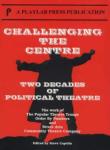'Queensland has been the scene of some remarkable, even notorious political events over the past twenty-five years or more. In that time a number of exciting theatre artists and companies have developed their philosophies and methodologies in this charged environment.
Challenging the Centre represents the first attempt to capture some of these significant artistic endeavours which have occurred over the period 1974 to 1994. This book focuses on three key political and community theatre companies and places their works in a national and international context.
The Popular Theatre Troupe had its origins in the early 1970s and was associated with a style of theatre which took political and social issues beyond the confines of traditional theatre spaces to industrial worksites, schools and to regional communities throughout Australia in a concerted attempt to offer an alternative analysis of the times.
Order By Numbers existed briefly but burned brightly with passion and indignation. Their history captured the anger and frustration of life under a repressive political regime.
Street Arts Community Theatre Company's work spans the 1980s and into the nineties and represents a radically different approach to the role of a socially relevant theatre company. Street Arts pursued a broader developmental approach to theatre in a community context and has made a significant contribution to community cultural development in Australia'
Source: Challenging the Centre (back cover)
 6731417787427849872.png
6731417787427849872.png
 Challenging the Centre : Two Decades of Political Theatre : The Work of the Popular Theatre Troupe, Order By Numbers and Street Arts Community Theatre
selected work
Challenging the Centre : Two Decades of Political Theatre : The Work of the Popular Theatre Troupe, Order By Numbers and Street Arts Community Theatre
selected work

